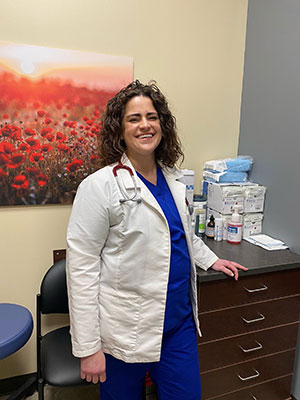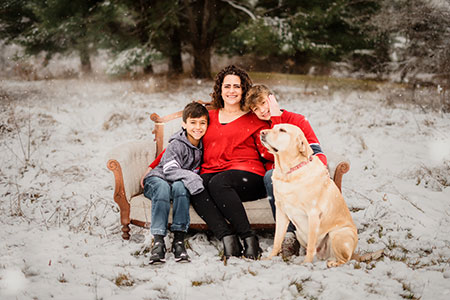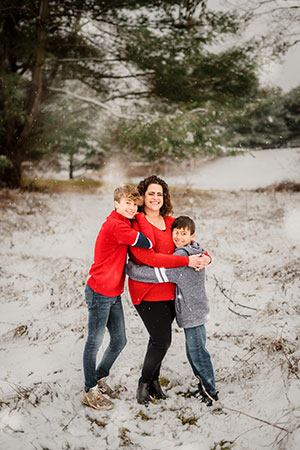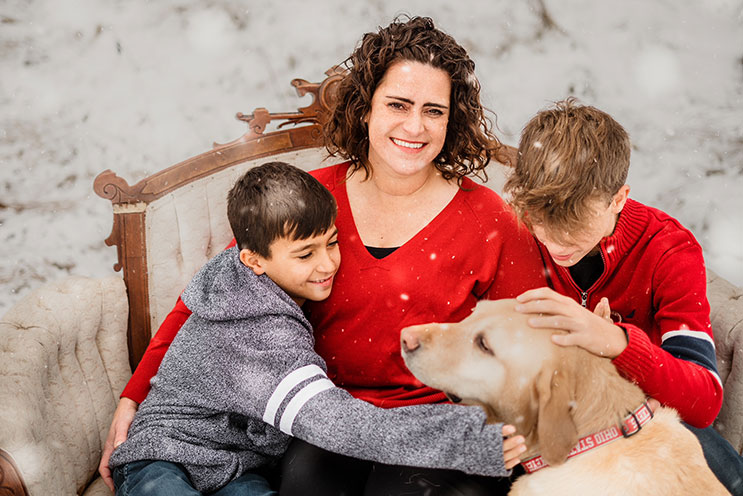Treating a Challenging Brain Tumor for a Meaningful Life
 Working as a nurse practitioner, Traci Van Gorden “struck gold” when she met neurosurgeon Adam M. Robin, M.D.
Working as a nurse practitioner, Traci Van Gorden “struck gold” when she met neurosurgeon Adam M. Robin, M.D.
By using advanced procedures, the expert treated her deep-seated brain tumor in four stages, stopped her seizures and preserved the lifestyle of the single mom with two kids.
Living near a lake in a rural area of Sturgis, 43-year-old Traci was an avid runner in good health who loved to swim, jet ski and kayak with her sons, 8 and 10.
“My children noticed I was having some odd episodes,” says Traci. “They said it looked like I was chewing on my tongue. My eyes would twitch, and one arm would convulse. I would briefly lose awareness.”
Sudden Small Seizures
The episodes are known as partial focal seizures, and soon, Traci would have one in front of her co-workers. “Afterward, I ate my lunch and saw patients. I didn’t go to the ER,” says Traci, who laughs about medical professionals sometimes being the worst patients.
Nevertheless, Traci had a next-day EEG, which identified nearly constant seizure activity. A week later, an MRI showed a large deep-seated brain tumor, a glioma. That’s when she heard about a physician who had been treated successfully for a brain tumor at Henry Ford.
On the Henry Ford website, Traci completed a self-referral form and within 45 minutes, a nurse called to schedule an appointment in five days. “The quick response inspired a lot of confidence in me,” says Traci.
Recalling her meeting with Dr. Robin, Traci says, “Dr. Robin is the most compassionate and down-to-earth physician I’ve ever met. He immediately put me at ease. I went from feeling terrified to knowing that I’d struck gold. He took time to ask a lot of questions about my life, not just my symptoms. He looked me in the eye, and I could see him listening, thinking about answers to my questions, and making sure I understood him. I was 100 percent convinced I was in the best hands.”
After the initial appointment, surgeons and oncologists on the tumor board discussed her case. Images showed the large insular tumor was growing deep in the brain, making surgery very challenging, says Dr. Robin. He and others were concerned about the possible loss of motor function and vision.
However, laser ablation technology could preserve those functions more reliably than by cutting. MRI scans during surgery and special technology would help control the laser temperature and treat the infiltrating tumor without the risk of injury to delicate blood vessels, says Dr. Robin.
“At our Center, we continue to develop this relatively novel use of laser ablation for deep-seated brain tumors. For a long time, neurosurgeons didn’t operate on gliomas in the insula because of the risks. But we’re taking advantage of newer technologies and that’s making treatment better for patients,” says Dr. Robin. In 2014, the laser technology was first used in Michigan for brain tumors at Henry Ford.
Four Surgeries and Victories
Traci’s treatment plan was made and within one month she would have the first of three laser ablation surgeries to kill the tumor. Next, an open craniotomy would remove the remaining tumor tissue.
“Traci understood the risks and benefits of the treatment,” says Dr. Robin. “We developed a lot of trust in one another, which is critical for dealing with challenging problems.”
 After the first surgery, Traci spent two nights in the hospital, and experienced only minor irritation around the pea-sized incision. A biopsy determined the glioma was grade 2.
After the first surgery, Traci spent two nights in the hospital, and experienced only minor irritation around the pea-sized incision. A biopsy determined the glioma was grade 2.
During the second laser ablation, something astounding happened. “I went into the hospital having five to ten seizures daily – even while on medication. When I woke up from surgery, it was like Dr. Robin had shut off a switch. The seizures were gone!” says Traci. “Later, when I told him, he jumped off his stool, gave me a high five and said, ‘You made my day!”
A few days after the third laser ablation, Dr. Robin performed an open craniotomy to remove deep-tumor tissue. Afterward, Traci experienced only mild headaches for two weeks. The overwhelming majority of the tumor had been surgically treated. Because of this, she says, “It was a beautiful blessing that I didn’t need any chemotherapy or radiotherapy. I believe I received the best care possible. All these victories are the accomplishments of my caregivers.”
Standing With Love
 People have stepped up in ways I never expected, says Traci. “Friends and neighbors had a fundraiser for me. My former in-laws drove me around when I wasn’t allowed to drive, and they drove four hours to Detroit for two surgeries.” Traci’s parents live four hours away in Ohio, and they helped with driving, weekend getaways and long visits during two surgeries.
People have stepped up in ways I never expected, says Traci. “Friends and neighbors had a fundraiser for me. My former in-laws drove me around when I wasn’t allowed to drive, and they drove four hours to Detroit for two surgeries.” Traci’s parents live four hours away in Ohio, and they helped with driving, weekend getaways and long visits during two surgeries.
“I’ve lost some people because they couldn’t handle this,” she says. “But the ones who stood by me have shown their commitment, love and support. I’m less stoic. I tend to cry more, and I’m more talkative. Noisy environments bother me. So, I wear earplugs during my kids’ sporting events. And sometimes, I need to be alone for a few minutes during social gatherings,” says Traci who works full time. Her sons stay with their dad on alternate weeks.
“Traci is a wonderful person,” says Dr. Robin. “She’s very compassionate, a great communicator and cares for her patients and ours. She’s donated to our financial programs, helping patients who are unable to work during their treatments.”
To help build security, Traci sees a psychologist at the Brain Tumor Center. “My doctors say positive things, and they expect long-term survival. But they also say anything can happen, and disease recurrence is likely,” says Traci. “I’m learning to cope and trying to stay healthy, as this will be a lifelong process.” Every four months, she has an MRI scan to monitor the eight percent of residual tumor. If it grows, laser ablation or a craniotomy is an option.
Looking back, Traci says that providers at Henry Ford take healthcare personally. “They’ve created a great culture within this research institute. They all really care.”
One Team. All for You.
Advice for others
Go to caregivers who you trust, says Traci. You deserve to feel comfortable, heard and understood. Also, really try to focus on the positive, encouraging aspects of treatment and recovery.
Her future?
“I hope to live meaningfully and see my children reach adulthood,” says Traci. “If I continue to put my trust in my caregivers and their treatment, I think there’s a good shot I’ll live long and be functional and meet that goal.”
.svg?iar=0&hash=F6049510E33E4E6D8196C26CCC0A64A4)

/hfh-logo-main--white.svg?iar=0&hash=ED491CBFADFB7670FAE94559C98D7798)
